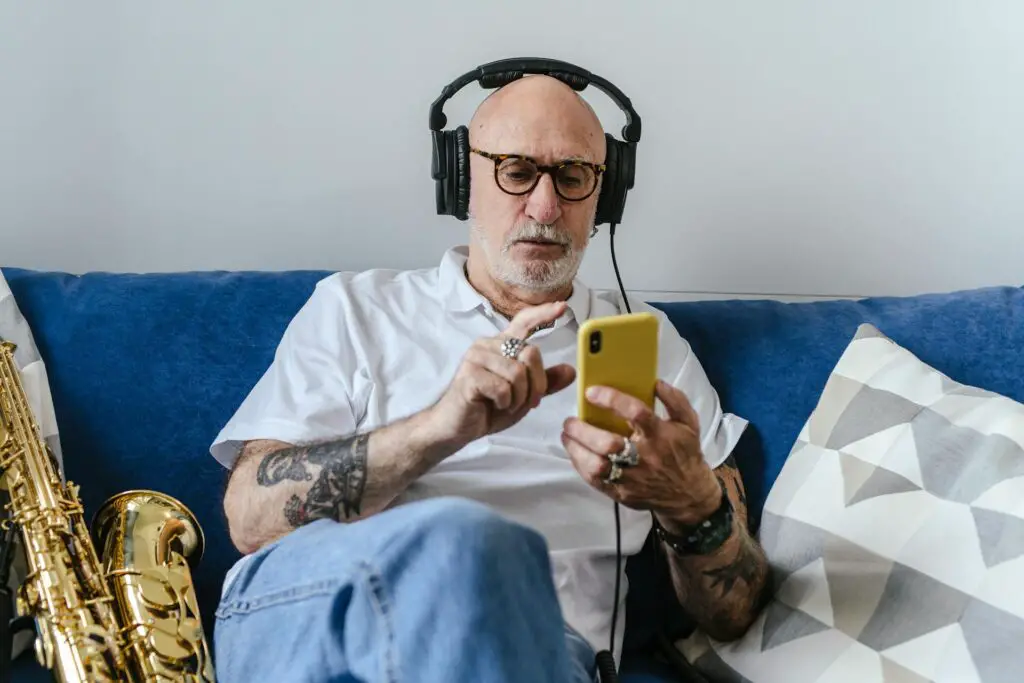Feel-Good Vibes: 10 Ways Music Boosts Boomer Health and Happiness

Music has always been part of life. For many boomers, it brings back sweet memories, from vinyl records to classic concerts. But music does more than stir nostalgia. Studies show it helps your body and mind in simple, real ways. From better sleep to fewer aches, music is a great tool for daily wellness. This list looks at ten ways music boosts health and happiness, plus why it’s worth trying.
Reduces Stress and Anxiety

A slow tune or soft melody can help ease your mind. Studies show that listening to music lowers cortisol, the stress hormone. That’s why many boomers turn to their favorite songs to relax after a long day. Classical music or easy listening works wonders for calming nerves. Fun fact — researchers found that Mozart’s music can even slow down your heartbeat. Best part? You don’t need a fancy setup — just a playlist and your favorite chair.
Improves Memory and Brain Power

Listening to music keeps your mind sharp. It wakes up parts of your brain that handle memory and focus. This is why music therapy is often used for people with dementia or Alzheimer’s. Familiar tunes help spark old memories and feelings. One fun fact — studies show that learning to play an instrument later in life can even grow new brain connections. It’s never too late to pick up that guitar or keyboard.
Boosts Mood and Fights Depression

Good music lifts the heart. Singing along to an upbeat tune floods the brain with dopamine — the “feel good” chemical. Many boomers use music as a simple, drug-free way to fight low moods. Fun fact — singing releases endorphins, the same chemicals that kick in after a good workout. Whether it’s ‘60s rock or Motown classics, the right music can turn a bad day around fast.
Helps with Sleep

Tossing and turning at night? Music might help. Slow songs or soft jazz can relax your body and mind, making it easier to drift off. Studies found that 45 minutes of calming music before bed improves sleep quality. Many seniors report fewer sleep problems when they make this a habit. Bonus tip — nature sounds or instrumental tunes work well too. Fun fact — sleep playlists are among the most popular on streaming platforms.
Promotes Social Connection

Music brings people together. Group singing, choirs, or even dancing with friends builds a strong sense of belonging. This is key for boomers who may face loneliness. Fun fact — studies show that singing in groups boosts oxytocin, a hormone tied to bonding. Karaoke nights or local music clubs are a fun way to meet new friends while doing something you love.
Encourages Physical Movement

You might not feel like exercising, but put on a great song, and your feet start moving. Music naturally makes you want to dance, stretch, or even just tap your toes. This is great for heart health and joint mobility. Fun fact — dancing to music burns as many calories as a light jog. Many boomers join Zumba Gold or dance classes made just for their age group — and they love it.
Eases Pain and Discomfort

Music has a way of distracting the mind from pain. Hospitals often use music therapy for patients dealing with chronic pain or after surgery. For boomers, this is a simple trick to make aches and pains less noticeable. Studies show that music can even lower the need for pain meds. Classical music, in particular, works well for this.
Sparks Creativity

Music wakes up the creative parts of your brain. Playing an instrument, writing a song, or even humming can help you see problems from a new angle. Many boomers pick up music hobbies to stay sharp and busy. Fun fact — studies show that musical training, even later in life, improves brain flexibility. You don’t have to be good at it; the joy is in the doing.
Brings Back Fond Memories

Certain songs can take you back to a moment in time. Music taps into deep memories linked to smell, sights, and feelings. This makes music a great tool for remembering loved ones or life milestones. Fun fact — the brain stores music differently from words, so even people with memory loss can remember songs long after they forget names.
Builds a Daily Routine and Purpose

Last but not least, music adds meaning to daily life. Whether it’s tuning in to a favorite radio show or learning a new song, music creates small joys to look forward to. Having these small daily goals is important for boomers, giving structure and purpose. Fun fact — studies show that a strong daily routine helps seniors stay independent longer.
Conclusion

Music is simple, free, and powerful. For boomers, it offers real health and happiness benefits, from easing stress to keeping the brain sharp. Whether you’re singing in the shower, joining a local choir, or dancing in the kitchen, music fits right into your life. It sparks joy, builds connection, and helps the body and mind age with grace. So, grab those headphones or dust off the old records — your feel-good playlist is waiting.
Leave a Reply